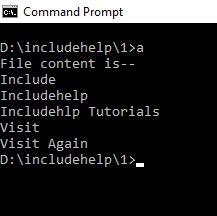C 中的 feof() 函数
原型:
int feof(FILE* filename);
参数:
FILE *filename
返回类型:整数(0 或 1)
函数的使用:
在 C 语言中,当我们使用与文件链接的流时,我们如何确定我们到达了文件的末尾。为了解决这个问题,我们必须将一个整数值与 EOF 值进行比较。通过 feof() 函数,我们可以确定文件是否发生了 EOF。这个函数的原型是int feof(FILE* filename);
当文件没有结束时,它返回值零,否则返回 1。
C 中的 feof() 示例
#include <stdio.h>
#include <stdlib.h>
int main()
{
FILE* f;
char str[100];
//Check the existence of that file
if ((f = fopen("includehelp.txt", "r")) == NULL) {
printf("Cannot open the file...");
//if not exist program is terminated
exit(1);
}
printf("File content is--\n");
//print the strings until EOF is encountered
while (!feof(f)) {
fgets(str, 100, f);
//print the string
printf("%s", str);
}
//close the opened file
fclose(f);
return 0;
}输出

相关用法
- C语言 ferror()用法及代码示例
- C语言 fread()用法及代码示例
- C语言 fillellipse()用法及代码示例
- C语言 fgets()用法及代码示例
- C语言 freopen()用法及代码示例
- C语言 frexp()用法及代码示例
- C语言 fclose()用法及代码示例
- C语言 fseek() vs rewind()用法及代码示例
- C语言 fflush()用法及代码示例
- C语言 fgetc()用法及代码示例
- C语言 fputc()用法及代码示例
- C语言 fputs()用法及代码示例
- C语言 fillpoly()用法及代码示例
- C语言 ftell()用法及代码示例
- C语言 fseek()用法及代码示例
- C语言 fgets() and gets()用法及代码示例
- C语言 fscanf()用法及代码示例
- C语言 fgetc() and fputc()用法及代码示例
- C语言 fwrite()用法及代码示例
- C语言 fork()用法及代码示例
注:本文由纯净天空筛选整理自Souvik Saha大神的英文原创作品 feof() function in C language with Example。非经特殊声明,原始代码版权归原作者所有,本译文未经允许或授权,请勿转载或复制。
